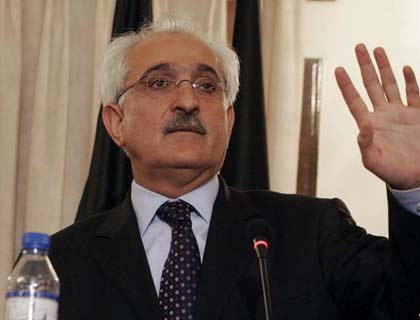KABUL - The U.S. must choose between having Afghanistan or Pakistan as a strategic partner before Kabul is willing to sign the Bilateral Security Agreement (BSA), Afghan National Security Advisor Dr. Rangeen Dadfar Spanta said on Thursday.
Dr. Spanta emphasized that the U.S. knows Pakistan is the main "obstacle" to the Afghan government's peace talks with the Taliban, yet refuses to acknowledge it.
"The United States is trying to tell the world and the people of Afghanistan that both the wolf and the sheep are their strategic friends," Dr. Spanta said. "Afghanistan's Southern and Eastern borders have been under attack for years, and those who are under attack are our women and children."
This week, reports were made in Kunar and Nangarhar provinces of increased rocket attacks originating from across the border in Pakistan. There have been a number of heated confrontations over the years between Afghan and Pakistani border outfits, but no resolution to the skirmishes has been found.
Although relations between Kabul and Islamabad seemed to be improving in the fall of 2013, with Pakistan participating in a number of bilateral discussions with the Afghan government about getting Taliban peace talks on track, Dr. Spanta's comments on Thursday made it clear that tensions were still high.
"One of the preconditions for signing the BSA is for the U.S. to choose a strategic partnership with one of the two," Dr. Spanta said regarding Afghanistan and Pakistan.
"How can you call a country who has sacrificed so much your strategic partner, and on the other hand, call those who send suicide bombers a strategic partner as well," he added.
Recent statements from Pakistani officials have signaled to Afghan leaders that Islamabad wishes to wait until after the Afghan elections in April before it is willing to help get peace negotiations with the Taliban going.
Dr. Spanta responded to these statements, claiming they were signs that Pakistan intended to continue its subversive activities in Afghanistan.
"Postponing peace talks to after the elections shows once again that Pakistan wants to interfere in the internal affairs of Afghanistan, same as the past three decades and 12 years, as they have continued their policy of sending suicide bombers and disrupting peace and stability in Afghanistan," Spanta said.
If the U.S. does not address Pakistan as the threat to Afghanistan that it is, Spanta argued, any attempt to be "strategic partners" would be highly questionable.
Meanwhile, the U.S. embassy in Kabul has said that they do not have a simple solution for peace in Afghanistan, echoing comments made by U.S. National Security Advisor Susan Rice at the end of 2013 when she told TOLOnews the U.S. had no "magic wand" that could bring about a peace deal.
Rice was responding to President Hamid Karzai's new preconditions for signing the BSA, which would ensure U.S. troops stay in Afghanistan post-2014. Following the Loya Jirga that approved the security pact in November, Karzai rolled out new conditions for the U.S. to meet before he would sign the deal, including getting Taliban peace talks back on track and ending America's unilateral operations inside Afghanistan.
U.S. Secretary of Defense Chuck Hagel said this week that the BSA cannot be postponed any further, and Afghanistan risks having no foreign troops or financial aid to support it after December if the deal is not signed soon.
But as the elections near, Karzai's time left in office dwindles and pressure from Washington and the Afghan public mounts, there are signs that the administration in Kabul may be more flexible on its preconditions for signing than previously thought.
"If there other ways in which we can ensure that Afghanistan will have sovereignty, no part of Afghanistan will have its own regional government, and the Afghan constitution will be applicable to all parts of Afghanistan...if there are ways that could lead to these goals, then I think there are grounds for signing the BSA," Spanta said on Thursday.
He said he was optimistic the agreement would be signed before the elections.
But Washington has shown no eagerness to meet the conditions already set by Karzai. And Spanta's goals seem to go beyond what American officials have indicated they are capable of guaranteeing. (Tolonews)

